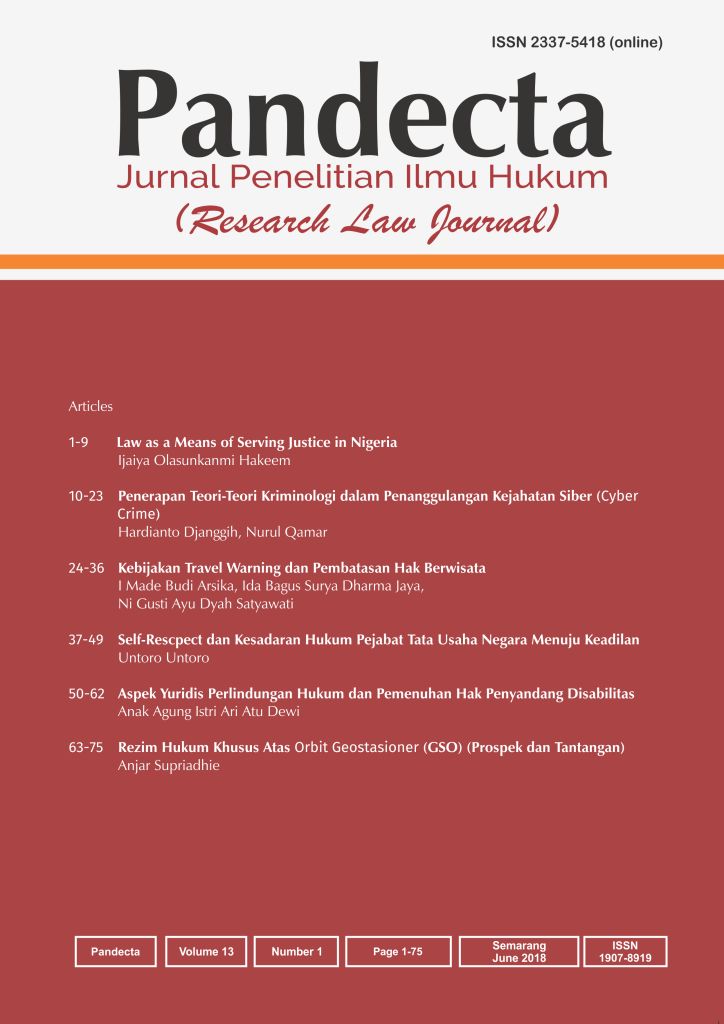Disobedience of The Constitutional Court’s Decision by The Supreme Court
(1) Faculty of Law, Universitas Diponegoro
(2) Faculty of Law, Universitas Diponegoro
(3) Faculty of Law, Universitas Diponegoro
Abstract
The Constitutional Court as one of the institutions that exercises judicial function has a final and binding decision that binds all parties. However, in practice, the decisions of the Constitutional Court are often ignored by parties, one of which is the Supreme Court. There are several Supreme Court decisions that do not consider the decisions of the Constitutional Court. This demonstrates disobedience to legal norms that are final. This is the reason why the researcher wants to examine the constitutionality of the Supreme Court’s decision which does not consider the decision of the Constitutional Court, and what are the legal implications. This research is doctrinal research with a normative legal approach, that used secondary data obtained through literature study. Based on the results of the study, the decisions of the Supreme Court which do not consider the decisions of the Constitutional Court can be said to be unconstitutional, or it can be said that there has been a violation of the constitution because the decisions of the Constitutional Court represent the essence of the 1945 Constitution of the Republic of Indonesia. The legal implication obtained are the supreme court decision is still be act as jurisprudence; there is legal confusion and uncertainty regarding the conflicting decisions; the occurrence of constitutionalism justice delay; and can undermine the authority of the 1945 Constitution of the Republic of Indonesia.
Keywords
Full Text:
PDFReferences
Atmadja, I Dewa gede. Hukum Konstitusi Problematika Konstitusi Indonesia Sesudah Perubahan UUD 1945. Malang: Setara Press, 2011.
Bachtiar. Problematika Implementasi Putusan Mahkamah Konstitusi Pada Pengujian UU Terhadap UUD. Jakarta: Raih Asa Sukses, 2015.
Desiana, Ayu. “Analisis Kewenangan Mahkamah Konstitusi Dalam Mengeluarkan Putusan Yang Bersifat Ultra Petita Berdasarkan Undang-Undang Nomor 24 Tahun 2003.” Majalah Hukum Forum Akademika 25, no. 1 (2014): 50.
Harjono. Konstitusi Sebagai Rumah Bangsa. Jakarta: Sekretariat Jenderal dan Kepaniteraan Mahkamah Konstitusi, 2010.
Isra, Saldi. “Titik Singgung Wewenang Mahkamah Agung Dengan Mahkamah Konstitusi.” Jurnal Hukum dan Peradilan 4, no. 1 (2015): 26.
Laksono, Winda Wijayanti et.al, Fadjar. “Implikasi Dan Implementasi Putusan Mahkamah Konstitusi Nomor 5/PUU-X/2012 Tentang SBI Atau RSBI.” Jurnal Konstitusi 10, no. 4 (2013): 733.
M.Nggilu, Novendri. “Menggagas Sanksi Atas Tindakan Constitution Disobedience Terhadap Putusan Mahkamah Konstitusi.” Jurnal Konstitusi 16, no. 1 (2019): 56–57.
Maulidi, M.Agus. “Menyoal Kekuatan Eksekutorial Putusan Final Dan Mengikat Mahkamah Konstitusi.” Jurnal Konstitusi 16, no. 2 (2019): 342.
Saputra, Rahmat. “Tinjauan Yuridis Terhadap Putusan MA 295 K/Pdt.Sus-Phi/2015 Yang Tidak Mempertimbangkan Putusan MK 19/PUU-IX/2011.” Jurnal Cakrawala 18, no. 1 (2018): 96.
Sri Darmadi, Nanang. “Kedudukan Dan Wewenang Mahkamah Konstitusi Dalam Sistem Hukum Ketatanegaraan Indonesia.” Jurnal Hukum 26, no. 2 (2011): 678.
Suhariyanto, Budi. “Masalah Eksekutabilitas Putusan Mahkamah Konstitusi Oleh Mahkamah Agung.” Jurnal Konstitusi 13, no. 1 (2016): 175.
Tim Penyusun Naskah Komprehensif Proses dan Hasil Perubahan UUD 1945. Naskah Komprehensif Perubahan Undang-Undang Dasar Negara Republik Indonesia: Buku VI, Kekuasaan Kehakiman. Revisi. Jakarta: Sekretariat Jenderal dan Kepaniteraan Mahkamah Konstitusi, 2010.
Utari Cristina, Ismail hasani, Dri, ed. Masa Depan Mahkamah Konstitusi RI: Naskah Konfrensi Mahkamah Konstitusi Dan Pemajuan Hak Konstitusional Warga. Jakarta: Pustaka Masyarakat Setara, 2013.
Widayati. “Problem Ketidakpatuhan Terhadap Putusan Mahkamah Konstitusi Tentang Pengujian Undang-Undang.” Jurnal Pembaharuan Hukum 4, no. 1 (2017): 10.
Refbacks
- There are currently no refbacks.


